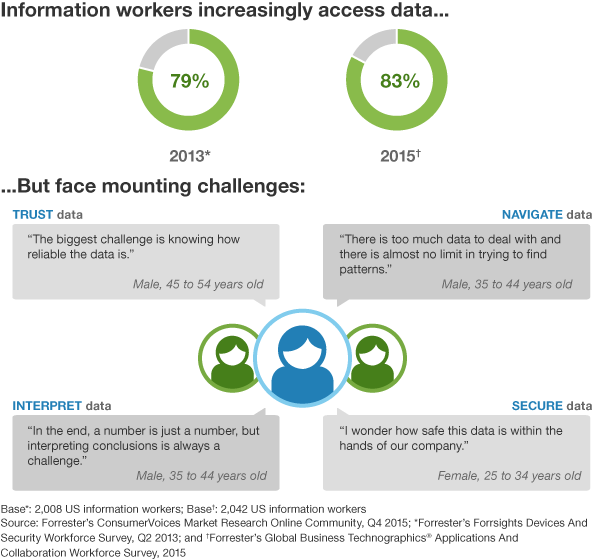The Data Digest: Turn Data Monotony Into Data Mastery
Next time you find yourself wading through data points, sifting out patterns from the noise, hoping to catch the rare pearl of insight to affix to your business plan, know that you are not alone. Employees worldwide incessantly engage with data, and the companies they work for urgently execute on data-driven strategies in a race for better, faster results. Data pervades the workplace and continues to grow in terms of volume and variety: Research suggests that by 2020, the number of connected devices will more than triple, tens of thousands of data scientist jobs will be in high demand, and the majority of sales decisions will be data-driven.
But using data regularly doesn’t mean that employees truly understand it – or are comfortable with data practices. Specific obstacles prevent individuals – at the top and bottom of the organization – from eliciting effective insight. Forrester’s Business Technographics® and ConsumerVoices MROC data shows that while individuals rely heavily on data for decision-making, they still grapple with key challenges regarding the accuracy, volume, value, and security of the data they use:

Employees realize that their data-rich world is the new normal; therefore, they seek to develop data mastery. For some, this means sharpening their analytic skills; for others, it means leveraging data resources across their organization more effectively. Ultimately, employees want – and need – support across the phases of data engagement. Employees are ready to move from data and insights to decisions and action more strategically.
In our recent report, my colleague Jennifer Belissent and I apply a multimodal research approach to detail how employees use and perceive data; highlight the risks and opportunities that business leaders must consider to drive their company culture forward; and identify how business insights professionals can build a smarter, data-ready workforce. As we state in the report: “the age of the customer demands that companies deliver faster and more personalized services. [But] as firms increasingly turn to data to gain a deeper understanding of their customers and fine-tune their operations, business leaders must minimize risks and inaccuracies that creep into employees’ daily data usage, and provide training to promote an insights-driven culture.”
